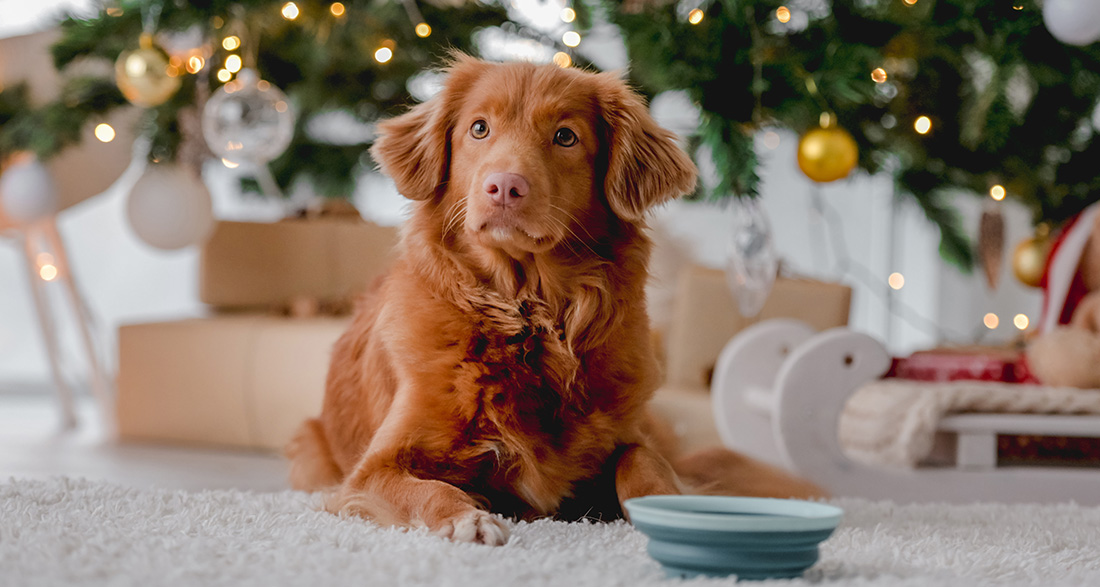During the Christmas season, when everything is festively decorated and the air is filled with the scent of delicious Christmas treats, many pet owners want to share the joy with their loyal companions.
For many dogs, the sight of crispy roast goose and the aromas wafting from the kitchen make their mouths water. And who can resist those sad puppy eyes? However, what is well-intentioned often ends with a trip to the veterinarian, as packaging materials, Christmas ornaments, and tinsel are not toys, and leftovers, cookies, and gingerbread certainly don’t belong in the dog bowl.

Scented Oils, Incense Candles, and Potpourri
Essential oils can cause severe poisoning in pets. In dogs, mucous membrane irritation and gastrointestinal complaints, sometimes in the form of cramps, can occur.
Symptoms: Shortness of breath, gastrointestinal complaints, cramps
Danger: Poisoning
Gifts (Packaging)
Gift wrappings, such as wrapping paper, ribbons, and bows, can pose various dangers. For example, dogs can strangle themselves while playing with thin ribbons. Moreover, swallowing gift wrap often leads to digestive disorders or even poisoning.
Symptoms: Digestive disorders, shortness of breath
Danger: Poisoning, Injuries
Glass Christmas Ornaments
Pets often play with the fascinating glittering Christmas decorations. Glass Christmas tree baubles can easily break, posing a high risk of injury to the sensitive paws of four-legged friends.
Symptoms: Bloody paws, open wounds on the body
Danger: Injuries
Yeast Dough
Christstollen and other Christmas baked goods are often made from yeast dough. Since yeast dough rises significantly, it should never be fed to dogs, as it can cause painful bloating.
Symptoms: Painful bloating, flatulence
Danger: Ruptures in the stomach or intestinal perforation
Candles & Tealights
Candles should never burn unattended, especially when pets are in the house, as a four-legged friend can easily knock over a candle. When freely roaming pets are present, it is advisable to avoid real burning candles on the Christmas tree (fire hazard). If dogs swallow candle wax, it can lead to blockages. Additionally, the color and fragrance substances contained in the wax can be irritating. The aluminum in tealights is also very sharp-edged and dangerous for pets.
Symptoms: Difficulty breathing, vomiting, diarrhea, abdominal cramps, fever, burns
Danger: Obstruction of the airways, gastric or intestinal obstruction
Tinsel
Tinsel can contain lead and therefore be toxic to dogs if accidentally ingested. For these reasons, it’s best to completely avoid tinsel in the house. If your dog does swallow tinsel and shows signs of shortness of breath, you should consult a veterinarian. Moreover, dogs can get entangled in tinsel while playing, leading to injuries.
Symptoms: Shortness of breath
Danger: Poisoning, Injuries
Gingerbread
Gingerbread usually contains cocoa, as well as spices like cinnamon and nutmeg. Therefore, consumption can be harmful or even deadly for dogs due to the cocoa content.
Symptoms: Vomiting, diarrhea, accelerated pulse, trembling, seizures, difficulty breathing
Danger: Poisoning, Death
Nutmeg
Nutmeg is often used in Christmas baked goods. Consumption can lead to tremors, seizures, and even be fatal for dogs.
Symptoms: Tremors, seizures
Danger: Death
Plants like Poinsettias, Mistletoe, or Christmas Roses
Plants like poinsettias, mistletoe, or Christmas roses should not be nibbled on by dogs. Consumption can cause poisoning symptoms such as severe mucous membrane irritation, stomach problems with cramps, as well as paralysis and a drop in body temperature.
Symptoms: Scratching and burning in the mouth and throat, diarrhea and vomiting
Danger: Poisoning
Plastic & Metal Decorations
Just like glass balls, plastic and metal decorations can be dangerous for dogs. They contain toxic substances and can block the airways, stomach, and intestines if swallowed.
Symptoms: Difficulty breathing, vomiting, diarrhea, abdominal cramps, fever
Danger: Obstruction of the airways, gastric or intestinal obstruction
Cookies
Cookies are made from various ingredients, especially sugar, nuts, and chocolate. Many of the cookie ingredients are extremely harmful to dogs. Therefore, dogs should not eat either raw or baked cookies.
Symptoms: Drooling, vomiting, diarrhea, fever, difficulty breathing, and seizures
Danger: Halting cellular respiration, leading to internal suffocation
Raisin Rolls
Consuming raisins and grapes can lead to fatal kidney failure in some dog breeds. Even small amounts can cause poisoning symptoms.
Symptoms: Stomach cramps, vomiting, diarrhea, and lethargy
Danger: Kidney failure
Snow Spray
Snow spray looks decorative on windows. However, if you are a dog owner, you should completely avoid using snow spray, as even small amounts can be toxic to dogs.
Symptoms: Difficulty breathing
Danger: Poisoning
Rock Salt & Antifreeze
When snow silently falls and the first ice crystals form outside, children’s hearts skip a beat: sledding, ice skating, and snowmen make the Christmas and Advent season perfect. However, to prevent it from becoming a slippery slide for drivers, rock salt and antifreeze are widely used. Rock salt is often mixed with ethylene glycol, which is toxic to dogs even in very small amounts. Ethylene glycol is also used in antifreeze.
Symptoms: Vomiting, staggering, accelerated breathing, and seizures
Danger: Severe kidney damage, fatal kidney failure
Pine Needles
Pine needles from the Christmas tree or Advent wreath are easily accessible to most pets. However, ingestion is very harmful to dogs as they contain essential oils. This can lead to life-threatening liver and kidney damage over time.
Symptoms: Symptoms of liver disease may include weight loss, weakness, colic-like pain, sensitivity to light, excessive sweating, and a rise in temperature.
Danger: Liver and kidney damage
Christmas Goose
Leftover food should not be fed to dogs in general. However, the remnants of a Christmas goose are particularly dangerous for dogs. If dogs chew on the included bones and swallow smaller sharp pieces, they can injure both the air and esophagus as well as the entire intestine from the inside.
Symptoms: Difficulty breathing
Danger: Choking, intestinal injuries
Cinnamon
Cinnamon is often used in cookies or other baked goods, especially during the Christmas season. However, the coumarin compounds contained in cinnamon inhibit blood clotting, which can be fatal for dogs. If you observe symptoms such as vomiting or drowsiness, you should immediately consult a veterinarian.
Symptoms: Local mucous membrane irritations, vomiting, or drowsiness
Danger: Inhibition of blood clotting


